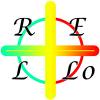Search the Community
Showing results for tags 'knowledge'.
-
Reason Vs. Emotion Vs. Belief Vs. Consciousness Reason, emotion, belief, and consciousness, have a fundamental place in epistemology and psychology but I have not found where they sit. I especially haven't found where they sit from first principles. My hope with this discussion is that these things can find their proper place. Emotions reflect belief and beliefs are always rational I have some ideas, each with their own arguments and evidence. From what I gather, Stefan has an implicit, specific conception of the relation between these things. The two major premises I can identify are 1) Emotions reflect belief, and 2) beliefs are always rational. Now, this second premise seems obviously false, but there is a corollary to it 3) beliefs do not necessarily reflect conscious thought. I should make it clear, by beliefs I mean what we really believe deep down and might not even be conscious of. Evidence for It's from these premises that much of the psychology in this community can be explained. We can explain the true self as rationality and the collection of beliefs. We can explain the false self as the origin of conscious thought that is not wholly informed by beliefs. We can explain free will by saying that it is a choice whether conscious thought wholly informs itself with belief. It also conforms with the evidence. It explains self-defence mechanisms where a person consciously thinks something but believes something else. It explains how personalities as a collective can be fragmented throughout history from all the evils that take place. It gives foundation to how a child protects themselves with false thoughts. It explains how psychotherapy works, by uncovering beliefs using critical thinking and self-reflection. It explains procrastination, as procrastination just reflects the belief of resentment. It would suggest we should follow our emotions as long as we identify them properly. Evidence against The issue is, there is a lot of evidence against these things. Are emotional leftist protesters simply misunderstanding their emotions? Are they masking a true self with a false self? Do people fall for propaganda because of the false self, or maybe we aren't actually innately rational? Another problem is, it seems incredibly redundant to have a true self making calculations, and then a false self making entirely different calculations about the same thing. Cognitive therapies suggest something is wrong with cognition itself. For example, schema therapy suggests that we have core beliefs that are often themselves unconscious and formed in childhood that are irrational and make us feel some ways or generate negative thoughts. It would be strange to have an extra layer to this by saying that those irrational core 'beliefs' are preceded by true beliefs. It is very hard for me to believe that emotions reflect belief and beliefs are always rational. But it also explains so much and makes life a lot easier. Argument for from first principles Extraordinary claims require extraordinary evidence. Rather than doing some kind of trial-and-error, making observations, etc, an argument from first principles would take away a lot of doubt about the psychology taught in this community. I would think that arguing for these psycho-epistemological concepts from first principles would be the most important thing, as the psycho-epistemology kind of defines what this whole community is about. I tried to find these first principles, and I found these quotes from Ayn Rand. "There can be no causeless love or any sort of causeless emotion. An emotion is a response to a fact of reality, an estimate dictated by your standards." (Ayn Rand, For the New Intellectual, p. 147) All knowledge is derived from reality, so emotions follow cognition. Perhaps we could further say from this that emotions reflect cognition. And, perhaps we can assume cognition and reason that goes with it have sovereignty. Indeed, doesn't seem logical that a rational faculty would allow something like 2+2=5. It is more likely that anyone who thinks such a thing is not using their rational faculty. It would also seem strange that the rational faculty would switch off, rather than keep working at the background. In fact, I think that our very feeling of having a self and having free will sort of rest upon the idea that we have some kind of sovereignty, and that we know what is best for ourselves, and we trust our faculties to give us the most accurate information possible. Perhaps this should be self-evident. Perhaps this is self-evident to any peacefully parented individual. Argument against from first principles Ayn Rand would disagree with our second premise; that beliefs are always rational. "Your subconscious is like a computer—more complex a computer than men can build—and its main function is the integration of your ideas. Who programs it? Your conscious mind. If you default, if you don’t reach any firm convictions, your subconscious is programmed by chance—and you deliver yourself into the power of ideas you do not know you have accepted. But one way or the other, your computer gives you print-outs, daily and hourly, in the form of emotions—which are lightning-like estimates of the things around you, calculated according to your values." (Ayn Rand, Philosophy: Who Needs It?, p. 5) also, "An emotion as such tells you nothing about reality, beyond the fact that something makes you feel something. Without a ruthlessly honest commitment to introspection—to the conceptual identification of your inner states—you will not discover what you feel, what arouses the feeling, and whether your feeling is an appropriate response to the facts of reality, or a mistaken response, or a vicious illusion produced by years of self-deception . . . . In the field of introspection, the two guiding questions are: “What do I feel?” and “Why do I feel it?” (Ayn Rand, Philosophy: Who Needs It?, p. 17) Rand is seeming to suggest emotions can reflect irrational thoughts. It seems beliefs held in the subconscious can be 'programmed by chance'. She says that using the rational faculty is not automatic but voluntary. So it has sovereignty, but it is up to a person to use it. Her view does make a lot of sense. Our working memory is incredibly limited, so thinking rationally would be incredibly limited. Perhaps there is no 'true self' beyond our ability to reason consciously. If Rand is right, I believe it challenges the psychology of this community. Rather than listening to a true self, and to emotions and their origins, her views would suggest we should rather use reason alone to find what is the right thing to do and to create habits out of it. Perhaps one problem with her view is that there is no ought from an is. It makes a lot of sense to me that only emotions can tell us something as trivial as what flavour of ice cream to have and something as serious as whether I should really marry some person. Maybe the truth is somewhere in between. Maybe the subconscious can be 'programmed by chance', but maybe it a somewhat active system which holds our true beliefs, while our conscious thoughts themselves can differ. What do people think? Can these premises be proven from first principles? Maybe you think the premises I outlined are inaccurate? How do you think is the best way to approach and deal with emotions and choices? Have any podcasts/books to share about this stuff?
-
I was listening to Podcast 2254 and in it the caller is confessing to physically abusing his siblings from when he was (I think) eight to early 19. The caller is able to see his lack of total responsibility when he was a younger teen, but when he mentions that he still inflicted this abuse when he was 18, Stefan mentions that it was already a habit by then. When he says this it feels like he's absolving the caller of some responsibility for his actions. This may be the case and this may be true, but I can't pinpoint the reason why habitual abuse holds the abuser less responsible than just abuse in general. My gut tells me that since his environment was so severe, he had no external indicators that what he was doing was wrong, and that knowledge of alternatives (arguments against what he was doing) were not easily accessible, his only line of defense which would be that shred of empathy that his parents were beating out of him was all that stood between him and abuse, and naturally that fell. Now abuse to him would become commonplace. He'd get used to it, his mind would be warped by it, and as he aged it would become a part of life. I think the key here is when you start abusing. If he would have started when he was 18, he would not have been desensitized to the violence as he was. With more maturity he certainly would have had a harder time starting considering it wasn't something he'd become accustomed to. It would be like bringing this alien into his life he'd never seen before. Another thing to consider is that right when he found FDR he stopped. UPB was that alternative that helped him see his abuse. It shined a flashlight on this thing that nobody had ever shined light on before. What does everyone here think about this? Moral responsibility isn't always a black and white ordeal as we know, but is it shifted by habitual abuse that started when the mind was much less mature that alternatives weren't available for?
- 3 replies
-
- moral responsibility
- call-in show
-
(and 3 more)
Tagged with:
-
MY stance is that humans are incapable of knowing anything, incapable of gaining any knowledge. This I believe is the strong form of epistemological nihilism, the weak form being 'there is no truth' which I am not defending, and I do not believe. Knowledge is a justified true belief. With each of the three components being necessary but not sufficient for knowledge. IF you do not believe it, then you do not know it. If it is false, then you do not know it. And most importantly, if you are not justified in believing it, you do not know it. For example if you 'know' that tomorrows powerball numbers will be 1, 15, 17, 22, 34 and then tomorrow we learn that those were in fact the powerball numbers and we ask you how you knew and you say "well I just sort of had a feeling I guess" then it cannot be said that you actually have knowledge. The justification is the biggest problem, in my opinion, with knowledge. Because any piece of knowledge needs justification, and any justification is going to be another claim of knowledge. Eventually you will end up getting to a point where you have to admit that you do not know, or you admit that you simply assume that it is the case. This means that all claims of knowledge, if they are founded on anything at all, are ultimately founded on assumptions. Assumptions are by definition something that we cannot know, they are things we have no evidence of, no proof for, and we just accept it as true because it is convenient for us to do so. Some of the basal assumptions that we try to build knowledge on may include things like 'the universe exists' and 'I exist' and 'my senses are fairly trustworthy' and 'my memory is fairly trustworthy' etc. These are all fine assumptions, there are assumptions that I make as well. But when these assumptions are the basis of your knowledge then you cannot claim that you actually know the thing. Because justification needs further justification, there is a recursion problem with knowledge as a whole. Truth has no recursion problem, because statements are true or false, independent of us. Even if nobody believed that the earth was round, it would still be round and "The Earth is round." would still be true. Belief has no recursion problem either, as believe requires no justification. As someone in chat pointed out, this means that anyone can believe anything for any reason. Sure. Why not. I don't see any problem with this, you are free to believe that the earth is flat for instance, it's just that you are wrong. (How do I know? I don't, but I am fairly confident.)
- 59 replies
-
- 1
-

-
- Epistemology
- knowledge
-
(and 1 more)
Tagged with:
-
If there is one thing that I never "came to terms with" in regards to Stefan's views on the major areas of philosophy is his take on epistemology. I could not identify from the very beginning what exactly was bothering me when he would argue epistemological problems but after a while, I think I identified the source of my distress, that is the synthetic-analytic distinction. I do not actually remember him ever specifically addressing this issue but by deduction from his viewpoints on epistemology, in general, it seems to me that he rejects the synthetic-analytic distinction (I have also read that Ayn Rand rejected this distinction too and since Stefan said that his views on epistemology mostly come from her, I would not be surprised if he does indeed reject this as well). The synthetic-analytic distinction basically puts propositions in 2 categories: -analytic propositions: those propositions "which are true by virtue of their meaning" Ex. There are no married bachelors. -synthetic propositions: those propositions which "are true by how their meaning relates to the world" Ex. Gases expand when heated. What I am arguing is that there is a fundamental difference of certainty we can have in relation to those 2 categories. The difference is that we can prove (100% certainty) whether an analytic statement is true or false, in other words, we have knowledge regarding those but we cannot prove whether a synthetic proposition is true or false since we must rely on external observation and experimentation and not on the laws of logic. How could we prove for example that we are not a brain in a vat? However, my impression is that Stefan does not believe in this distinction (is my impression wrong?) for him "gases expand when heated" and "there are no square circles" are equally "provable". How come? Did he ever give any arguments for this? Ultimately, what is your take on this subject?
- 46 replies
-
- 1
-

-
- knowledge
- epistemology
-
(and 1 more)
Tagged with:
-
I am looking for a quote about pursuit of knowledge that will end up on a permanent display in a library of a mid-size American university. Can you help me? Something along our libertarian beliefs. It should be a "single-sentence quote from an author or historic figure on topics relevant to the pursuit of knowledge." Stefan counts as an author. Keep in mind, the library has the last word on the quote.
-
Hello everyone, new to the forums but I though I should post a very important topic of mine here, hopefully this is the right section. So here is my case: I feel very stressed and confused with all the libertarian videos and this includes Stefan’s. I find myself in quite a dilemma, for all the insightful and good information stef and other provide I find new information merely adding to my stress and pain and more I know and more I learn the less reason I see to care about certain things. Some might find this silly or even bizarre but I simply cannot see any reason to add to what I already accept and the moment I try to bring this information to the rest of the world threes nothing much other than stress and painful endless argumentation going on. I cannot convince anyone, every time I do try I get so stressed I can’t sleep until I get response and frankly all this negative doom and gloom (real events or/and fear of them) push my energy low and my apathy higher. Does it seem that I am just being over reactive to bad news? Or does it seem like case where I try FOOLISHLY to be the atlas and carry world’s troubles on my shoulders and eventually just collapse? I want to live my life but I don’t want to live in this endless cycle that 100'% wasteful and unnecessary. Please, if anyone has had similar experiences, any help would be appreciated. I naturally want good mental condition and good life as much possible but I do not want to feel like lazy bum for not trying to change people’s minds and being philosophically static. However I feel my sleep, health and just overall STUFF that happens in normal everyday life has alarmingly faded in place of worry and constant anger at peoples idiocy and ignorance. My thanks beforehand, Anssi J. However i feel my sleep, health and jsut overall STUFF that happen in normal everyday life has alarmingly faded in place of worry and constant anger at peoples idiocy and ignorance. My thanks beforehand, Anssi J. PS. Also even psoting this i find myself unable to do much at all but jsut wait and wait... for replies. I do not know if this speaks volumes of me or may even hint at possible answer that i just need time to relax and recover... :S



